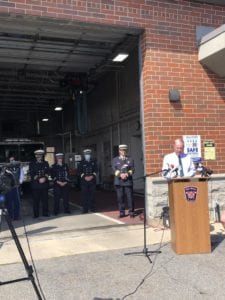Who is a member?
Our members are the local governments of Massachusetts and their elected and appointed leadership.

Fall River Mayor Paul Coogan (far right) speaks during an April 28 Safe Stations press conference.
The city of Fall River has opened its six fire stations to people facing addiction, helping people get treatment and services now rather than having to respond to overdoses later.
The Safe Stations program, possibly the first of its kind in the state, allows people to walk into any city fire station between 7 a.m. and 9 p.m. and request addiction help in a judgment-free environment. While there, people receive an initial medical screening, help from a recovery coach, and, if needed, a mental health evaluation. The program has helped 15 people since its March 1 launch.
In the field, Fire Lt. William Lonardo said, he can reverse an overdose with the drug Narcan and take a patient to the hospital, but he can’t reverse a family’s heartbreak or help clean up the aftermath. This program allows the department to help prevent overdoses, he said.
“It kind of redefines our role,” Lonardo said. “It’s really neat, actually, in that we have patients who now come to us, instead of us having to go to them. … When you’re looking for different ways to be useful to your community, this is a big one.”
Initially delayed by the pandemic, the city took about a year to develop its program. It’s modeled after the Providence Safe Stations program in Rhode Island, a state that has seen several such programs materialize in recent years. City officials also researched New Hampshire programs dating back to 2016, and said they are hearing that interest is starting to build here in Massachusetts.
“This program is starting to flourish into other communities, which is a great, great thing,” said Timothy Oliveira, Fall River’s director of medical services.
The city is collaborating with nonprofits and medical providers to offer the service. The Fire Department provides the stations and transportation. It works with Steppingstone Inc., which provides the recovery coaches; Stanley Street Treatment and Rehabilitation; St. Anne’s Hospital/Steward Health; and Boston Medical Center and Bay Cove Human Services, which partner to provide mental health services.
Officials said the program doesn’t cost the city much to run. Besides providing transportation and access to the stations, it has spent money mainly on COVID tests, flyers, and “Safe Station” building signs. Steppingstone pays for the recovery coaches.
When a person seeks help at a fire station, personnel find a private meeting spot and request a recovery coach. So far, only a couple people have needed urgent medical attention, officials said.
Typically, recovery coaches have 30-minute response times, and need only an hour or so to arrange next steps for the client — possibly longer if Bay Cove needs to send someone to conduct a mental health evaluation.
The process cuts bureaucratic delays that often confront people seeking help, particularly those with mental-health diagnoses, said Stephanie Perry, an addiction nurse specialist at St. Anne’s Hospital in Fall River. Otherwise, those patients can wait days in the emergency room before getting transferred, she said. In one case, Perry said, a woman who spent three days in the ER without getting a treatment bed went to a fire station a week later. Within an hour, she met a recovery coach and arrived at her detox bed almost immediately afterward.
“That’s an amazing outcome, considering what it could have been,” Perry said.
The program’s main benefit, she said, is that “those recovery coaches are coming right to that person at the time of need.”